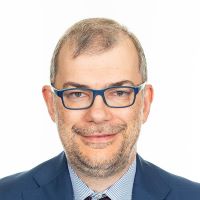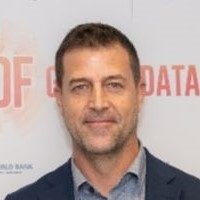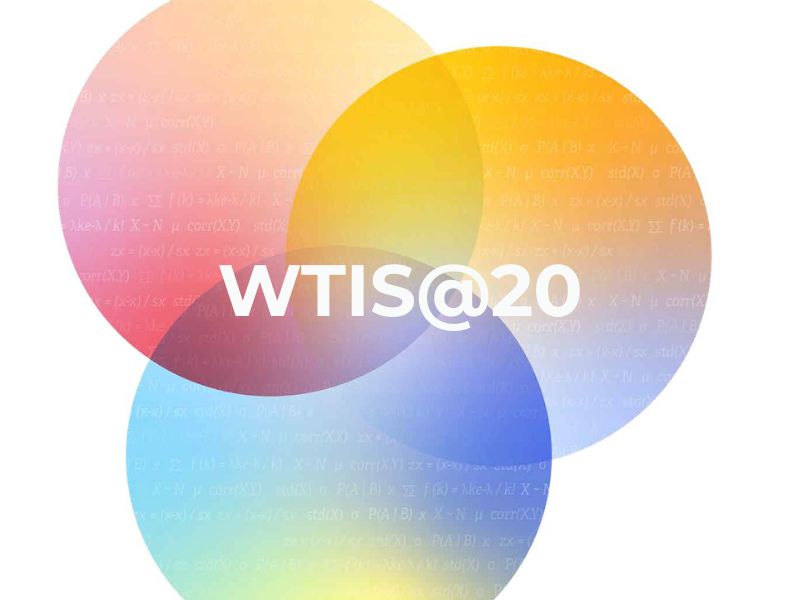

Dr Cosmas Luckyson Zavazava
Director
Telecommunication Development Bureau (BDT)
International Telecommunication Union (ITU)

Ms Apolonija Oblak Flander
WTIS-25 Chair
Director-General
Statistical Office
of the Republic of Slovenia

Professor Paul Cheung
Director
Asia Competitiveness Institute
Lee Kuan Yew School of Public Policy
National University of Singapore

Mr Nor Azhar Hassan
Head
Industry Research and Data Analytics Division
Malaysian Communications and Multimedia Commission (MCMC)

Mr Bernard Banda
Director for Economic Regulation and Consumer Protection
Zambia Information and Communications Technology Authority (ZICTA)

Ms Romina Cachia
Scientific Team Leader
Digital Economy Unit
Joint Research Centre
European Commission

Ms Hasnae Fdhil
Director of Communication and Cooperation Division
High Commission for Planning
Morocco (Kingdom of)

Mr Thierry Geiger
Senior Economist and Head of the ICT Data and Analytics Division
International Telecommunication Union (ITU)

Mr Panayiotis Kyriakides
Economist
Office of the Commissioner for Electronic Communications and Postal Regulation (OCECPR)
Cyprus (Republic of)

Ms Sonia Livingstone
Professor
Department of Media and Communications
London School of Economics and Political Science

Ms Araceli Martinez Gama
Deputy Director General of Economic Surveys
National Institute of Statistics and Geography (INEGI)
Mexico

Ms Farah Michelle Paredes Viera
Head
Design and Analysis Division
National Office of Statistics
Dominican Rep.

Dr Cosmas Luckyson Zavazava
Dr Cosmas Luckyson Zavazava took office as Director of the Telecommunication Development Bureau (BDT) at the International Telecommunication Union (ITU) on 1 January 2023.
With more than 30 years in telecommunications, including over 20 years in ITU’s Development Sector, Dr Zavazava has promoted and implemented impactful information and communication technology projects around the world.
Prior to his election as BDT Director, he served as ITU’s Chief of Partnerships for Digital Development, overseeing development-related projects, strategic partnerships, and resource mobilization between 2019 and 2022, while launching new initiatives that have boosted the engagement of industry, private-sector and academia members in ITU’s work.

Mr Tomas Lamanauskas
Tomas Lamanauskas is Deputy Secretary-General of the International Telecommunication Union, elected at the ITU Plenipotentiary Conference of 2022, and taking up duties as of January 2023.
His 25 years of experience spans across sectors of telecoms and digital policy, regulation and strategy, stemming from executive level positions in agencies, companies, and organizations across Europe, the Middle East, the Caribbean and the Pacific region.
As Deputy Secretary-General of ITU, Tomas focuses on the financial sustainability and operational excellence of the organization. He also works to raise the digital industry’s ambition in fighting the climate crisis through the Green Digital Action initiative and promotes investments into the digital infrastructure as well as digital resilience through the Digital Infrastructure Investment Initiative and other efforts. Additionally, Tomas contributes to the global efforts to harness the opportunities and mitigate challenges of new technologies, in particular Artificial Intelligence, including through his role as a co-chair of the United Nations Inter-Agency Working Group on AI. He is also playing a key role in ensuring ITU’s support to other UN-wide development and governance efforts, including through the World Summit of the Information Society process and membership at the Operational Steering Committee of the UN Joint SDG Fund.
Tomas holds Master’s Degrees in Public Administration (Harvard), Leadership and Strategy (London Business School), Telecommunications Regulation and Policy (The University of the West Indies) and Law (Vilnius University).

Ms Apolonija Oblak Flander
Ms Apolonija Oblak Flander was appointed Director-General of the Statistical Office of the Republic of Slovenia in April 2024.
Ms Apolonija Oblak Flander has been employed at the Statistical Office of the Republic of Slovenia for 25 years. In 2001, she became Head of the Demographic Statistics Section and focused on population censuses and demographic analysis. Between 2014 to 2020, as the Head of the Transport, Tourism and Information Society Statistics Section, she focused on developing tourism, transport and ICT statistics and on introducing new data collection methods and acquiring new (alternative) data sources for official statistics. In 2021 she was appointed Director of Environmental Statistics and in 2023 Acting Director-General.
Ms Apolonija Oblak Flander is an active member of the European Statistical System Committee, She is the Chair of the OECD Working Party on Tourism Statistics and the ITF Transport Statistics Working Group. She is the Vice-Chair of the Bureau of the UN Statistical Commission and the member of the Bureau of the UNECE Conference of European Statisticians.
She is also the member of the Working Group of the Government of the Republic of Slovenia for Monitoring South East Europe Strategy 2030, South East Europe Statistical Authorities Network and numerous national committees and working groups related to tourism.
She holds a master’s degree in social and political geography. In her master’s thesis, she studied national and ethnic minorities.

Professor Paul Cheung
Professor Paul Cheung is the Director of the Asia Competitiveness Institute, Lee Kuan Yew School of Public Policy, National University of Singapore. He leads a team of researchers assessing Asia’s socioeconomic development. His latest book ‘Cross-Border Data Flows: Connecting the Digital Economies in ASEAN and Beyond’ was published in 2024 by Routledge.
Professor Cheung was previously the Chief Statistician of Singapore and the Director of the United Nations Statistics Division. In Singapore, he was instrumental in establishing an innovative data architecture built on registers, data exchanges, and integrated information systems. The 2000 census made full use of population and business registers and deployed an internet-based data collection protocol.
At the United Nations, he facilitated the development of the global statistical system. He supervised a programme of work that included the development of international statistical standards, the dissemination of global statistical data, and the development of national statistical systems. He was also responsible for implementing UN mandates on geospatial data and analytics. He established an inter-governmental platform in 2011 on Global Geospatial Information Management (GGIM).

Mr Nor Azhar Hassan
Nor Azhar Hassan joined MCMC in November 1999 and was appointed Head of the Industry Research and Data Analytics Division in September 2021. Prior to this role, he served as Head of the Infrastructure Division at MCMC for nearly four years.
In his current position, Nor Azhar is responsible for spearheading the development of advanced data analytics and market research strategies, utilizing cutting-edge analytical tools and methodologies. His work is closely aligned with MCMC’s strategic direction, aiming to enhance both the accuracy and speed of evidence-based decision-making and policy formulation.
Nor Azhar holds an honors degree in Electrical Engineering from the University of Evansville in Indiana, USA. He is also a member of the Board of Engineers Malaysia (BEM) and the Institution of Engineers Malaysia (IEM).

Mr Bernard Banda
Mr Bernard Banda is currently Director for Economic Regulation and Consumer Protection at the Zambia Information and Communication Technology Authority, the regulator of Information and Communication Technologies in Zambia. He is also the Chair of the Expert Group of Telecommunication Indicators at the International Telecommunications Union. Bernard has extensive experience in research design and implementation, policy analysis and data analytics. In the last few years, he has led several national demand and supply side surveys in Zambia and is actively involved in a number of regional initiatives in Africa.

Mr Andrea Barone
Andrea Barone is an applied economist with over 20 years of experience in economic analysis and policymaking in the telecom and digital sectors. He joined the World Bank in 2018 as senior adviser to the Chief Economist for the MENA region, and in 2021 became senior economist in the Digital Vice Presidency. He is currently leading the development of the digital topics’ sections of several World Bank data platforms including the newly launched Data360. He is also participating in policy dialogue and lending operations in several countries.
Earlier in his career he worked at the Italian Competition Authority, where he carried out antitrust investigations, merger control analyses and market studies in different sectors (telecoms, media and broadcasting, e-commerce, banking and finance, payment systems, insurance, manufacturing, water and sanitation, waste management). In that period, he was also a Registered National Expert for EU competition and consumer protection law and policy within TAIEX, the Technical Assistance and Information Exchange instrument of the European Commission.
He holds a PhD in Economics from the European University Institute in Florence (Italy), a MSc in Economics from the London School of Economics and Political Science, a BSc in Business and Economics from the University of Florence.

Ms Romina Cachia
Romina Cachia is a scientific team leader at the Digital Economy Unit, at the Joint Research Centre (European Commission). She leads the team dealing with the societal implications of the digital transformation. Her recent research focuses on the interface between the digital transformation, emerging technological trends, and social implications. Romina is also a senior visiting lecturer at the University of Malta and a member of the Laboratory of Personal Networks and Communities at the University of Seville.

Ms Clara Centeno
Clara Centeno is a researcher at the Joint Research Centre of the European Commission, where she has been conducting socio-economic research since 2001. Her work has primarily focused on the interplay between Information and Communication Technologies (ICT) and digital skills in promoting socio-economic inclusion, informing the development of EU policies. Specifically, her research has concentrated on vulnerable populations, underpinning policy initiatives related to long-term care, migrant integration, youth, digital and social inclusion, and education.
In recent years, her research agenda has shifted towards analyzing digital skills gaps, investigating the feasibility of the European Digital Competences Certificate, and exploring the relationship between well-being and digital education.

Mr Alvaro Diez Soto
Mr Alvaro Diez Soto is Head of Unit at Eurostat, the statistical office of the European Union, where he oversees the development and publication of statistics on digitalisation, science, and technology. With a background in computer engineering, he previously held various leadership roles in Eurostat’s IT units dedicated to statistical production. Prior to joining the European Commission in 2011, he worked for several years in the private IT sector.

Ms Hasnae Fdhil
Hasnae Fdhil has been Director of Cooperation and Communication at the High Commission for Planning of Morocco since May 2018. She has extensive experience in designing and managing cooperation projects that support the production, analysis, and dissemination of official statistics in Morocco. Her expertise also includes resource mobilization to advance statistical modernization. She has served as a member of several national strategic statistical committees and, at the international level, was a member of the IAOS Executive Committee (2017–2020) and of the Advisory Board of the Statistical Journal of the IAOS (2020–2021).

Ms Scarlett Fondeur Gil
Scarlett Fondeur Gil is an Economics graduate from the Santo Domingo Institute of Technology in the Dominican Republic, with a Masters in International Relations from the University of East Anglia in the United Kingdom. She has been working for the last nine years as an Economic Affairs Officer for the ICT Analysis Section of the UN Conference on Trade and Development, UNCTAD, based in Geneva, Switzerland. She and her colleagues produce the annual Information Economy Report, which analyzes trends on ICT and the information economy in developing countries and makes policy recommendations to UNCTAD member states. She is also involved in the development of internationally comparable ICT statistics in the context of the Partnership on Measuring ICT for Development, which is composed by 13 international organizations. In this context, UNCTAD is a member of the Partnership’s Task Group on E-waste measurement. UNCTAD currently collects data on the use of ICT by businesses, on the ICT sector, and on international trade in ICT goods, and aims to continue developing statistical work on measuring trade in ICT services, and gender and ICT.

Mr Michael Frosch
Michael Frosch is the senior statistician at the International Labour Organization (ILO). He joined the Statistical Standards and method unit at the Department of Statistics at ILO in 2016. He was leading the work with developing the 21st ICLS resolution concerning statistics on the informal economy. He has also contributed to the work of developing the new statistical standards on work relationships and is now the ILO focal point for its implementation. Prior ILO, Michael Frosch worked with the Danish Labour Force Survey at Statistics Denmark as a senior advisor.

Dr Archana G. Gulati
Dr Archana G. Gulati is Deputy to the Director of the ITU’s Development Bureau. With over 34 years of experience in policy making and regulation, she specialises in universal service, digital transformation, regulation of frontier technologies and competition regulation. Her journey began as an Indian Civil Services officer (1989 batch), and she continued to excel in her field after taking voluntary retirement in 2021. Her career milestones include serving as the Director, Public Affairs and Policy at Google, India, until October 2022.
Dr Gulati’s academic journey is marked by her pursuit of excellence. She holds a BA Honours in Economics from Lady Sri Ram College, University of Delhi, an LLM (Telecom & IT law) from the University of Strathclyde, UK, and a PhD. from the Indian Institute of Technology, Delhi.
Her various posts in the Indian government include Advisor (Digital Communications) at the National Institute for Transforming India (NITI Aayog), Senior Deputy Director General / Officer on Special Duty to the Chairperson of the Telecom Commission of India, and Advisor and Head of the Combinations (M&A) Division at the Competition Commission of India. She has also held the position of Financial Advisor to the National Disaster Management Authority of India. Prior to joining the ITU, she was a professor of digital regulation at leading public policy and business schools in India. She has also previously served as an expert with the International Telecommunications Union.

Mr Thierry Geiger
Thierry Geiger is Senior Economist and Head of the Data and Analytics Division at the International Telecommunication Union. Prior to joining ITU in 2020, Mr Geiger spent 15 years at the World Economic Forum in various roles. As Head of research and benchmarking within the Centre for the New Economy and Society, he was in charge of several benchmarking studies and initiatives, including the flagship Global Competitiveness Report and Global Gender Gap Report series, and led the development of a dozen of composite indicators. He led the Centre’s competitiveness practice for Asia and the Pacific and was responsible for technical assistance and capacity-building activities. Mr Geiger also worked for the World Trade Organization and Caterpillar Inc, and co-founded Procab Studio, a Geneva-based IT company. A Swiss national, Mr Geiger holds a BA in Economics from the University of Geneva, an MA in Economics from the University of British Columbia, and was a Fellow of the World Economic Forum’s Global Leadership Programme.

Mr Paul Hamilton
Paul Hamilton is a GIS Expert for the Environment and Emergency Telecommunications Division (EET) at International Telecommunication Union (ITU). He has been working on the Disaster Connectivity Map project since 2019, and the ITU Transmission Map project since 2012. Paul also researches and publishes the annual Africa Telecom Transmission Map, maintains Africa Bandwidth Maps, and has worked for over 20 years as a short term consultant for network operators, financial institutions and industry organisations. He previously worked as the Telecom Research Manager at World Markets Research Centre, and holds a degree in Geography and International Politics from Keele University (UK).

Mr Panayiotis Kyriakides
Panayiotis Kyriakides is an Economist at the Office of the Commissioner for Electronic Communications and Postal Regulation (OCECPR) of Cyprus. He serves as Vice-Chair of the ITU Expert Group on Telecom/ICT Indicators (EGTI) for the 2025–2028 term and represents Cyprus as the national focal point for the ITU Global Cybersecurity Index. He has over 15 years of experience in telecom regulation, ICT statistics, and for the past 5 years in cybersecurity indicators. He led the design of Cyprus’ national ICT Observatory, contributed to the first effort to revise the ITU ICT Development Index, and co-chairs the Contact Network of the Euro-Mediterranean Regulators Group (EMERG). He has also been appointed to ENISA’s informal task force for the revision of the Cybersecurity Index.

Dr Min Suk Lee
Dr Lee is the Executive Director of Korea Information Society Development Institute (KISDI) and serves as a Vice-Chair of the ITU Expert Group on Telecommunication/ICT Indicators (EGTI). He holds a Ph.D. in Economics and has provided policy advice to the Government of Korea for more than a decade in the field of telecommunications. His expertise lies in the reform of regulatory frameworks, including market entry regulation, as well as in addressing antitrust concerns in the ICT markets. Dr Lee has also overseen the annual competition assessment of the Korean telecom market, contributing to evidence-based policymaking and regulatory improvement.

Ms Sonia Livingstone
Sonia Livingstone OBE FBA is a professor in the Department of Media and Communications at LSE. She has published 21 books on media audiences, children and young people’s risks and opportunities, media literacy and rights in the digital environment. Since founding the EC-funded “EU Kids Online” research network, and Global Kids Online (with UNICEF Office of Research-Innocenti), she has advised the Council of Europe, European Commission, European Parliament, UN Committee on the Rights of the Child, OECD, ITU and UNICEF. She is currently leading the Digital Futures for Children centre at LSE with the 5Rights Foundation. See www.sonialivingstone.net

Mr Oliver Lysaght
Oliver Lysaght works in UNITAR SCYCLE, having been involved in the drafting of the third edition of the E-waste Statistics Guidelines in 2024. He is leading activities to test the proposed changes in the guidelines, including through the 2025 International Workshop Series on E-waste Statistics being ran in partnership with UNEP as part of the project ‘Enhancing Countries’ Capacities for Measuring Progress on the transition towards a Circular Economy’.

Ms Esperanza Magpantay
Esperanza Magpantay is the Senior Statistician at the ICT Data and Analytics division of the International Telecommunication Union (ITU), where she has worked since December 2000. She oversees and contributes to the collection, harmonization, and dissemination of ICT statistics and represents the ITU in various international initiatives and working groups, including the Partnership on Measuring ICT for Development and the UN Inter-agency Expert Group on SDG Indicators. Ms. Magpantay leads the UN-Committee of Experts on Big Data and Data Science for Official Statistics (UN-CEBD) Task Team on mobile phone big data, collaborating with over 50 experts from international and regional organizations, national statistics offices, and research entities.
She has represented the ITU at numerous international meetings, such as the UN Statistical Commission, the UN World Data Forum, and the International Conferences on Big Data, delivering presentations and trainings on ICT statistics. Before joining the ITU, she spent 7 years at the International Labour Office (ILO) in Geneva as a statistical officer. Ms Magpantay holds a Master’s degree in Business Analytics and Big Data from IE University in Madrid, Spain, and a Bachelor of Science in Statistics from the University of the Philippines.

Ms Araceli Martinez Gama
Araceli Martínez Gama completed her bachelor’s degree in Actuarial Science at the National Autonomous University of Mexico.
She joined the National Institute of Statistics and Geography in October 1986, holding various positions; she currently serves as Deputy Director General of Economic Surveys within the Economic Statistics Unit.
Her main responsibilities include planning and coordinating the development, collection, processing, analysis and results of short-term and structural economic statistics in the sectors of construction, manufacturing, trade and private non-financial services, as well as surveys on information and communication technologies, science and innovation, productivity and competitiveness, business financing, and international travel, among others.

Mr Trevor Monroe
Trevor Monroe is a Senior Program Manager with the Development Data Group at the World Bank. Trevor leads programs that put Data and AI to work for development. Currently, Trevor manages a program under the Global Data Facility to help countries develop capacity to use Mobile Phone Data for Policy and Official statistics.

Ms Linah Ngumba
As a trailblazer in the field of ICT statistics, Ms Linah Ngumba spearheads this sector at the Kenya National Bureau of Statistics, the National Statistics Office (NSO). She handles ICT-related research and analysis in the organization. Ms Ngumba was instrumental in establishing the ICT statistics division, introducing the Economic Survey report, orchestrating ICT enterprise and public institution surveys, and integrating an ICT module in the integrated household budget surveys and the 2019 Population and Household Census. Currently, she chairs the International Telecommunication Union’s Expert Group on ICT Household Indicators. Ms Ngumba hold master’s degrees in the fields of Communications Management and Economics, in addition to her bachelor’s degree in economics and Statistics.

Mr Winston Oyadomari
Winston Oyadomari (he/him) is an expert on survey methodology with 15 years of experience in the private and non-profit sectors and a contributor to EGH since its inception, having led several subgroups. Currently, he is a researcher at CETIC.br (Regional Center for Studies on the Development of the Information Society), with special attention to innovative survey methods. He holds degree on Public Administration from Fundação Getúlio Vargas São Paulo (FGV-SP) and speaks Portuguese, English, Spanish, and Italian.

Ms Farah Michelle Paredes Viera
Farah Michelle Paredes Viera is a sociologist with over 15 years of experience in household survey design, demographic analysis, and public policy research. She currently serves as Vice-chair of the ITU’s Expert Group on Household Surveys (2025–2029) and leads the Design and Analysis Division at the Dominican Republic’s National Office of Statistics. Farah also coordinates the ITU subgroup on measuring artificial intelligence through household surveys, promoting innovative and inclusive methodologies to capture the social dimensions of emerging technologies. She has led multidisciplinary research initiatives, advised international organizations, and presented globally gender-sensitive data, time use, and migration statistics. Her work is focused on strengthening the role of household surveys in evidence-based policymaking and sustainable development.

Ms Anu Peltola
Ms Anu Peltola, Director of UNCTAD Statistics, oversees the statistical work of the UN Trade and Development (UNCTAD), releasing official statistics and analytical datasets on trade and development for almost all countries globally at the UNCTADstat Data Centre. UNCTAD Statistics develops new indicators on productive capacities and inclusive growth to measure progress, releases guidance and tools e.g., on measuring gender equality in trade and publishes Data Insights in its SDG Pulse and UNCTAD Handbook of Statistics. UNCTAD is the custodian agency of nine SDG indicators on international trade, investment, illicit finance, south-south cooperation, and enterprise sustainability, and supports countries in measuring them. Ms Peltola co-leads with UNDESA and UNDP a UN Secretary-General’s high-level expert group on Beyond GDP to Value What Counts, and she coordinated a UN effort to cost the achievement of sustainable development. Ms Peltola serves as the co-chair of the Committee of Chief Statisticians of the UN System. Prior to joining UNCTAD, she worked at the UNECE Statistical Division and started her career at Statistics Finland.

Dr Daniel Power
Dr Daniel Power is the Managing Director of the Flowminder Foundation, a not-for-profit organisation dedicated to utilising mobile and other data to inform and support humanitarian and development policy and decision-making. With a background in data analysis and strategic project management, Dr Power leads Flowminder’s efforts to enhance the use of mobile data in addressing critical global challenges.
Flowminder’s work focuses on leveraging anonymized mobile operator data and other sources to provide crucial insights into population movements and resource needs, particularly in low- and middle-income countries. The foundation’s projects span disaster response, public health, development planning, and poverty alleviation, significantly impacting how data is used to improve lives and support sustainable development goals.
Dr Power’s expertise includes strategic leadership, underpinned by a rich understanding of the complexities involved in using big data for social good. This encompasses partnership mobilisation, data engineering, privacy protection and ethics, data analysis, and supporting the practical use of data. His leadership at Flowminder is characterised by a commitment to people-centred principles, ensuring that the organisation not only utilises cutting-edge technology but also harnesses the collective expertise of its team to make a tangible impact on global humanitarian and development efforts.

Mr Alan Ramírez García
Alan Ramírez García is a telecommunication policy consultant for the Peruvian government and international organizations. His areas of expertise include broadband policies, rural connectivity, digital gaps, and international and multilateral affairs. In 2021, the United Nations Secretariat appointed him as a member of the Multistakeholder Advisory Group (MAG) for the Internet Governance Forum (IGF), from 2022 to 2024. He is also a lecturer at the Department of Engineering at the Pontifical Catholic University of Peru (PUCP).
Alan holds a telecommunication engineer degree and a master’s degree from the Technical University of Catalonia – Barcelona Tech, Spain, and two master’s degrees in telecommunication engineering and government and public policy from PUCP.

Mr David Rausis
David Rausis is a member of the Data, Analytics and Statistics Section at the United Nations Office on Drugs and Crime (UNODC). He is responsible for overseeing the Section’s crime statistics portfolio. In this role, he leads the global data collection on crime and criminal justice statistics, contributes to the development of analytical briefs on crime trends and patterns, and supports the development and implementation of international methodological frameworks and guidelines, including on the measurement of cybercrime.

Mr Geoffrey So
Geoffrey So is a global health epidemiologist and external relations strategist with nearly 20 years of experience across multilateral, corporate philanthropy, and private sectors. He specializes in building innovative public-private-philanthropic partnerships (PPPPs) and mobilizing investment for the global public good. As Head of Strategic Engagement at the WHO Foundation, he spearheads these collaborations for the WHO. His career includes key roles within the UN Secretary-General’s office, mobilizing support for the Every Woman Every Child initiative and the SDGs. His work bridges global health with digital technology, including serving on the UN Broadband Commission’s Working Group (WG) on Digital Health. He is the inaugural chair of the OECD netFWD WG on Health and Philanthropy, and board member of the Health Finance Institute, which develops innovative financing for Non-Communicable Diseases (NCDs).

Mr Deniz Susar
Deniz Susar is a Governance and Public Administration Officer, Digital Government Branch, Division for Public Institutions and Digital Government is a Governance and Public Administration Officer at the Division for Public Institutions and Digital Government of UNDESA. Deniz’s main work areas include digital government and preparation of the biannual UNDESA flagship publication ‘United Nations E-Government Survey’. As part of his current role, he also supports the Internet Governance Forum (IGF). HIs main research areas include e-government, open government, citizen engagement, internet governance, artificial intelligence and other frontier technologies and open government data. Deniz holds a Master Degree on International Political Economy and Development from Fordham University, New York, United States and a Computer Engineering degree from the Bosphorus University of Istanbul, Turkey.

Ms Natalia Vicente
Natalia Vicente is Vice President of Public Affairs at GSOA, where she works closely with the Director General and the CEOs of GSOA Member companies to drive forward high-level advocacy for the satellite communications sector. Specifically, Natalia focusses on the Development Agenda working with international organisations to ensure nation states benefit from the value of leveraging available satellite communications services to bridge digital, education and health divides.
Natalia is a Co-Chair of the EQUALS Access Coalition. Natalia has over a decade of experience in the digital sector, focusing on public policy, government relations and building international partnerships.
Natalia is a qualified lawyer with an LLM from the University Autonoma of Madrid and holds a Master of Business Administration specialised in Marketing. She is a Spanish national, lives in Brussels and speaks 4 languages.

Dr Žiga Žarnić
Dr Žiga Žarnić leads OECD’s work on digital well-being and Sustainable Development Goals analytics for data-driven policymaking at the intersection of technology, sustainability, and socio-economic development. With 15+ years of experience in policy work on digitalisation, sustainability, and industrial economics, he has led major OECD initiatives, including the Digital Well-being Hub and the Hub on Sustainable Development Goals, advancing global efforts to track progress and drive action. Previously, he led the OECD Round Table on Sustainable Development fostering collaboration between governments and business leaders to drive the green-digital transition, and managed OECD frameworks on inclusive and green growth, post-COVID recovery, and corporate sustainability metrics – playing a key role in founding the Business for Inclusive Growth Coalition under the G7. His expertise spans advisory roles at the OECD Secretary-General’s Office, the OECD Environment Directorate, and the Slovenian Prime Minister’s Strategic Council for Macroeconomic Affairs.

About
Under the theme “WTIS@20: The past, present and future of digital development statistics”, the 20th edition of the World Telecommunication/ICT Indicators Symposium (WTIS-25) reflected on nearly three decades of progress since the first symposium in 1996 , highlighted current priorities, and explored new data needs to support digital development in an evolving landscape.The symposium brought together policymakers, business leaders, regulators, statisticians, and researchers to learn, share, and helped shape the telecommunication/ICT statistics agenda.
WTIS-25 was held in Geneva, Switzerland, from 22 to 23 September 2025.



